I remember my grandpa’s broad shoulders rocking over his bicycle, as I was cycling behind him on the road linking Ariano to Adria. It was a bright summer day, with no clouds nor wind, which was crushing Polesine, the province of my hometown Rovigo, under a red-hot sun. The afternoon heat felt heavy on my clothes, as my legs were stiffening in the attempt to keep up the pace.
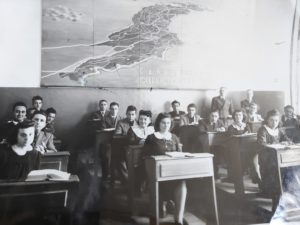
I was probably ten years old and I had decided to retrace with my grandfather the journey he used to do every day, as a teenager, to get to his high school. I thought that staying close to him as he relived his memories was a good idea. And I was also eager to show him that, although still young, I could be as strong as the bersagliere he used to be. We got on our bikes in Ariano nel Polesine, where he was born, and started cycling the almost 18 kilometres separating it from Adria, where the high school Bocchi that he attended was located. A one-hour journey in each direction, which he undertook on a daily basis for years in all weather conditions, after getting up at dawn. In case of rain, the only protection was a small cape to cover his back and books: wet hair and damp clothes were not enough of an excuse to skip school. They would simply dry during class, dripping on the floor, his soaked shoes pushed in a corner against the wall.
Luckily for me, my mother had decided to follow us during the trip. As we were crossing the Po river, a long truck got dangerously close to me, pushing me towards the edge of the bridge. Feeling dizzy from the exhaust gas I had breathed and the adrenaline pumping in my chest, I decided to stop. I pushed my bicycle in the car’s trunk and kept following my grandpa from behind the windscreen, feeling ashamed for my weakness.
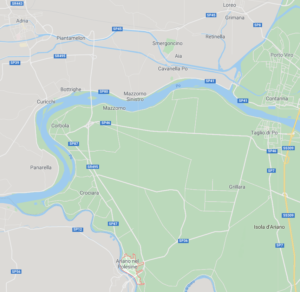
Growing up in Ariano nel Polesine certainly taught my grandpa how to deal with difficult situations. He was born on March 29th, 1921, in a poor and swampy land, infested with malaria, which in that area remained endemic until a complete drainage was finalised in the ‘30s. His family had limited economic means: his mother Norina was a housewife and his father Luigi a public employee in charge of monitoring the local section of the Po di Goro river. Three siblings were sharing the house with him: Gabriella, Raffaella, who would die of sickness during the war, and Enzo, who would become a British prisoner of war after a battle in Africa and sent to India.
The simple but dignified domestic life was a safe haven from the violence affecting Polesine and contributing to the birth of the fascist regime.
The creeping civil war that would have eventually brought Mussolini to power, and which resulted in hundreds of victims, was indeed already raging. A few days before my grandpa was born, fascist squads had ambushed Ermenegildo Fonsatti, Ariano’s socialist mayor. He was brutally beaten and left on the ground in a pool of blood. He would die two months later of his injuries.
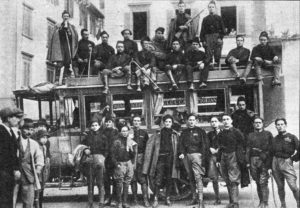
This was the squads’ modus operandi. Night ambushes, when darkness harbours its scariest nightmares, in ten, fifteen, twenty men against one, all armed with wooden batons and knives. Their attacks systematically targeted socialist leaders, who were beaten, kidnapped or killed in front of their families, just next to their horrified wives and crying children. Other objectives were the offices of socialist newspapers, cooperatives and trade unions. Landowners and business leaders provided the targets, to remove anything or anyone capable of sustaining the widespread workers’ protests.
Such protests were indeed becoming a real obsession for the Italian middle class in the years following the first world war. The Russian revolution had been successful and was a source of inspiration, a different future seemed possible, strikes and occupations of factories were more and more common and social order appeared completely subverted. A red shiver was running down Italy’s spine: revolution was a concrete possibility and the state appeared unable to avoid it. In October 1919, the socialist party’s programme openly stated that “the proletariat will have to resort to violence to conquer power and consolidate the revolutionary achievements, hence establishing the transitory regime of the proletariat’s dictatorship”. And in September 1920, the socialist party’s provincial congress in Ferrara confirmed that the party had to “paralyse all powers, all the middle class’ state tools, in order to facilitate the revolution and the establishment of the proletariat’s dictatorship”.
The multiplication of such threats sew panic. The clear weakness of the state and the mounting fear of bolshevism created the ideal conditions for the birth of fascism. The black shirts effectively took over the role of the police and started suppressing any revolutionary intent with methodical brutality. It is no coincidence that squadrismo was more prominent in northern Italy, where big economic interests were exercising considerable pressure to stop the reds at all costs. With the blessing of the Church of course, always the archenemy of godless socialists.
The hostile land of Polesine was at the crossroads of such contrasts.
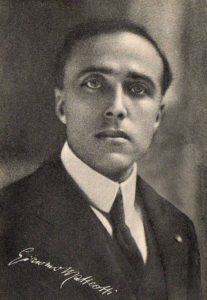
Giacomo Matteotti was born in 1885 in Fratta Polesine, a remote village lost in the Po valley that became famous for its superb Badoer Villa, designed by the architect Andrea Palladio, and for having been the headquarter of the carbonari della Fratta, a secret society established in the early 1800s to fight the Austrian domination.
Matteotti was an elegant man, thin and with sweet eyes. He became a Member of Parliament for the socialists in 1919 and delivered his first detailed report on fascist violence in March 1921, when my grandpa came to life. But the answer to his speech came from an unexpected direction. The Member of Parliament who took the stage was an ex classmate of his at the Celio high school in Rovigo and the only catholic politician elected for Don Sturzo’s popular party in the Ferrara and Rovigo constituency. A friend that Matteotti had once saved from an attack of socialist workers in Lendinara, a village in the Polesine. Umberto Merlin, to whom the city of Rovigo will dedicate a square decorated by a beautiful foundation, stood up and said that before worrying about those killed by the fascists, the Parliament should have better focused on those killed by the socialists.
The applause that rang in the hemicycle stunned Matteotti. But his denunciation fell on deaf ears only inside the Parliament. Outside, it did not go unnoticed.
A few days later, Matteotti was visiting Castelguglielmo together with the mayor of Pincara, two little villages in Polesine. This time around however, the fascists, seeking revenge, were waiting for him. They kidnapped him, forced him into a truck and run around the countryside for hours, leaving him in at dawn close to Lendinara. It was a night as long as a lifetime. Nobody knows exactly what happened, but apparently one of the captors decided to get creative and use his baton in a different way. After that episode, clients of local brothels started making fun of Matteotti. The “Matteotti” indeed became a service in very high demand, as well as the source of endless vile jokes. The humiliation was harsher than the physical punishment.
While Matteotti was openly facing the growing fascist threat, the Italian socialist party, up to that point a very powerful force, began a stunning process of self-destruction.
In 1921, the party split in Livorno, giving birth to the Italian communist party (PCI). The following year, a few days before Mussolini’s march on Rome, the XIX Congress of the Socialist Party kicked out Filippo Turati and its fellow reformists: they were accused of working with the catholic party to create a new Giolitti-led government aiming to isolate the fascists. When Turati visited the King for a round of political consultations, Togliatti, one of the PCI’s leaders, launched a violent attach on him on the newspaper L’Ordine Nuovo, defining him “one less dead body to carry along in the future”.
At the IV Congress of the Communist International, held in Moscow in October 1922 among mounting fears, the Russian Bolsheviks and Trockij himself tried to bring together the various representatives of the Italian Left by suggesting the creation of a united antifascist front. It was all in vain. For the Italian revolutionaries, democracy and fascism were, apparently, the same thing. The Left was plunging in a fratricidal war, fought in the name of an ideological purity that was blind to any danger, even if clear and present.
Meanwhile, in December 1921, Michele Bianchi, Secretary of the fascist party, had the audacity of writing on the Popolo d’Italia that fascist squads and party sections were an inseparable mix. After the creation of a militia that was trying to replace the army and the police, those responsible should have been arrested. But Italian institutions were in the process of being dismantled, ripped apart by intestine wars fought by too many factions, led by a King incapable of initiative and stunned by the mounting fascist violence.
This is why the march on Rome ended up being successful. The state was exhausted, Italian citizens too and many people immediately jumped on the bandwagon. The list of those who curried favour with Mussolini is embarrassing. The philosopher Benedetto Croce cheered him at the San Carlo theatre in Naples when the Duce said that he was not ready to share power with anyone. The writer Pirandello visited him at Palazzo Chigi, became a member of the fascist party and declared, during an interview, to “have always greatly admired him”. The poet Ungaretti asked him to write a foreword for his masterpiece Il porto sepolto. King Vittorio Emanuele III awarded him with the Collare dell’Ordine supremo della Santissima Annunziata, the highest honour of the Italian royal family. Like flies to manure.
As everything was falling apart, left-wing parties became increasingly unable of opposing the regime. Some representatives of the left were reluctant to do so because they were still hoping that Mussolini, once a socialist himself, would have eventually served the interests of the proletariat. But there comes a time, in politics as in life, when prolonged forbearance ceases to be a virtue and becomes an excuse for irresponsibility.
The only one not to give up the fight, regardless of his growing isolation, was Matteotti.
At the 1924 elections the fascist party received 64,9% of the votes. The electoral success was particularly strong in the centre and south of Italy, whereas workers in the north remained faithful to left-wing parties, with great disappointment of Mussolini. The parliament became a black sea. A darkness that Matteotti openly challenged just one and a half months after the elections. He did so by stating the obvious: the elections had not been fair, they had been influenced by the presence of an armed militia on the ground, no citizen had the possibility to freely decide who to support and electoral frauds had been reported. His speech, less than one-hour long in its original version, took four hours to complete, as it was repeatedly interrupted by the angry screams and threats of fascist Members of Parliament. The president of the Assembly, Alfredo Rocco, ended up recommending caution to Matteotti in the attempt to restore order, almost foreseeing the consequences of that meeting.
Nothing is indeed more threatening than truth. And in any case Matteotti already knew what would have happened. Once he finished his speech, he turned towards a fellow MP and said: “I’ve done my speech. Now you have to prepare my eulogy”.
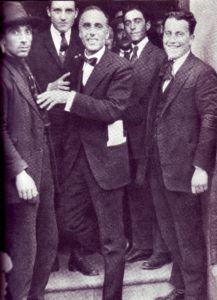
Mussolini was furious. Although in public he kept his composure and maintained a conciliatory approach, he immediately turned to the fascist Ceka, the secret police established only a few months earlier. Its name derived from the Russian secret police, the Ceka, which Lenin had authorised to resort to violence in order to defend the new-born communist state.
A few days later Matteotti was therefore kidnapped while walking to the Parliament from his apartment in Rome and forced into a Lancia Lambda. This time around however, mindful perhaps of his previous kidnapping, he decided to fight. The struggle inside the car lasted for a long time, four men against one, with Matteotti refusing to calm down regardless of the blows he was receiving. Unable to restrain him, his kidnappers ended up stabbing him. Matteotti died some time after that, soiling the car with his bodily fluids. Filippo Filippelli, the journalist who provided the car to the kidnappers, simply smiled and asked them to clean it up, noticing that Matteotti had fallen victim to a “bowel crisis”.
When his dead body was found and news of the murder spread, fascism appeared to waver. The ensuing investigation resulted in a frenzied blame game inside the fascist party and a wave of horror and indignation shook Italy. Mussolini had to reconsider his public appearances, whereas opposition MPs decided to leave the Parliament. For a long moment, the possibility of toppling the government felt real. But King Vittorio Emanuele III did not ask for Mussolini’s resignation and no clear sign or initiative came from the opposition, which remained divided, sterile and scared of fascist retaliation.
In the end, Mussolini decided to solve the impasse by bluffing. In early 1925, he addressed the Parliament and screamed to MPs that they “had the right to accuse the King’s ministers and bring them to court”. He then asked if anyone, inside or outside the Chamber, was planning to do so. The question was met by a stunned silence, as MPs swallowed tears and exchanged shameful glances. One shout would have been enough, but the only thing left in the room was the dark echo of the Duce’s voice.
Fascism therefore managed to survive. Mussolini raised his voice again and assumed political responsibility for the recent tragic events, adding that he would have been proud to lead fascism even if it was a criminal organisation. A slap to the state and its institutions, which was met by applause and defined Italy’s destiny.
Although tumultuous, these years were still the only ones marked by the naivety of childhood for my grandpa, when there is no space nor understanding for violence, power and its dynamics. He would have soon woken up to a nightmarish world, falling rapidly into the abyss and requiring a methodical preparation to violence, swallowed like a bitter drug by a recalcitrant body.
Fire and war would have been his final test.
Bravo, Filippo! I’ve only read the first two installments so far, but I must say I am looking forward to the next chapters already! Very well written and I really think the way you connect the personal story of you and your grandfather with the broader historic developments works perfectly!
Thanks a lot man, much appreciated! The most recent posts, dealing with the war, are longer, as there is more to cover. Hope you’ll like those too!